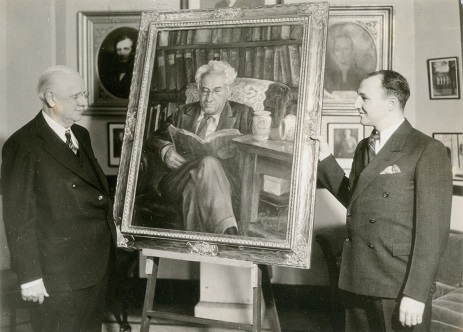| Home |

| Photo of the Month June 2021 |
| See Previous Photos Unknown Faces and Places |
 |
Upon the death of Dr. Charles Herbert LaWall in Philadelphia in 1937, his portrait was painted and presented by artist Leon A. Spielman (right) to the Philadelphia College of Pharmacy and Science, received by President Wilmer Krusen
Charles had served for years as dean of the College, his alma mater. He was widely known as the author of a revised, comprehensive code of ethics for pharmacists in an effort to expand quality standards in the profession. It was entitled "Pharmaceutical Ethics" and printed in the Journal of the American Pharmaceutical Association. He served on its national executive committee of the Association in 1920-1921, and his other memberships included the American Chemical Society, The American Association for the Advancement of Science and Philadelphia's prestigious Franklin Institute.
The choice of painting Charles seated reading, against the backdrop of crammed bookshelves, is especially appropriate. He kept an extensive research library in their home and relied heavily upon his accumulated body of knowledge for his many published writings. He once credited his wife one "who does not object when I bring old or new books home, and who endures in silence the chaotic appearance of our home during periods when manuscript is in preparation or proof is being read; whose stimulating companionship has made all my work possible." Among his many publications were The Curious Lore of Drugs and Medicines (Four Thousand Years of Pharmacy), The Pharmacy and Science of Dickens' Writings and Tomato Ketchups.
His wife, Millicent Saxon Renshaw, of the family of Elizabeth (Heilman) Mills Renshaw of Mauch Chunk/Jim Thorpe, PA, also was a graduate of the College, having received her degree in 1904. She became a pharmacist in her own right and at one time served on the teaching staff of the Women's Medical College of Philadelphia. She also helped to edit the publications United States Pharmacopoeia, the Practice of Pharmacy and the United States Dispensatory. She held strong views about stenography as "women's work," once writing that women should not work in jobs that "require arduous manual labor" but rather fields such as stenography where they could employ their "almost infinite amount of patience and capacity for endurance." In addition to her many professional accomplishments, she retained a love of her German heritage and loved to bake yellow cake using saffron, known to her as a "common household remedy" among Pennsylvania Germans.